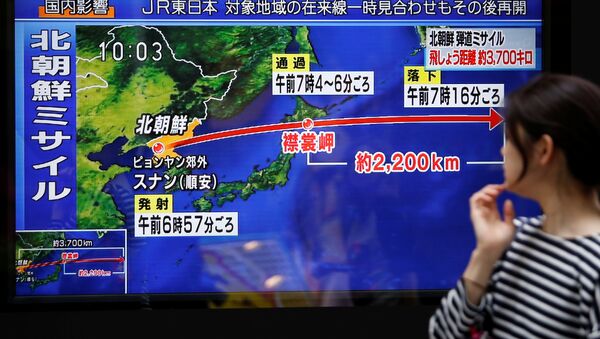The unidentified projectile was heading east, according to published reports, after leaving the launchpad around 6:57 a.m. local time. The missile flew for about 20 minutes until falling into the Pacific Ocean at 7:16 a.m. about 2,000 kilometers east of Hokkaido, NHK reported citing Japanese government officials.
— Kevin Meyerson (@kevinmeyerson) September 14, 2017
Japanese citizens in several prefectures were warned to find shelter following reports that a missile was airborne, NHK reports, adding that the missile probably cruised over the Japanese island of Hokkaido.
"US Pacific Command detected and tracked what we assess was a single North Korean ballistic missile launch," Dave Benham, Director of Media Operations at USPACOM, said in a release, adding that the "initial assessment indicates the launch of an intermediate range ballistic missile."
Recently captured satellite imagery showed increased activity near the Punggye-ri nuclear test site in North Korea. "Such activity… suggests that onsite work could now be changing focus to further prepare those other portals for future underground nuclear testing," according to 38 North researchers, a group dedicated to studying North Korean security topics.
The South Korean Office of the Joint Chiefs of Staff reports that US and South Korean personnel are currently investigating the details of the launch. Military analysts assess the missile flew 3,700 kilometers and reached a peak altitude of 770 kilometers, according to published reports.
— Joseph Tame (@tamegoeswild) September 14, 2017
Japanese authorities have strongly protested the latest launch by North Korea.
"We declare a strong protest in the harshest possible terms," Chief Cabinet Secretary Yoshihide Suga told reporters Friday morning.
Japanese denizens report Patriot Advanced Capability-3 (PAC-3) interceptor missiles were not launched in response. Some analysts believe the test was a direct response to the UN Security Council's most recent round of sanctions that were passed unanimously.
"At this moment, we have no information about any damage to ships or aircraft," Japanese spokesman Yoshihide Suga told reporters, adding, "there have also been no reports about missile debris falling in our territory."

